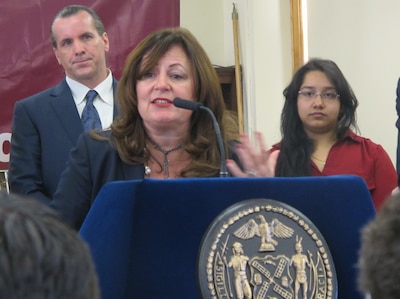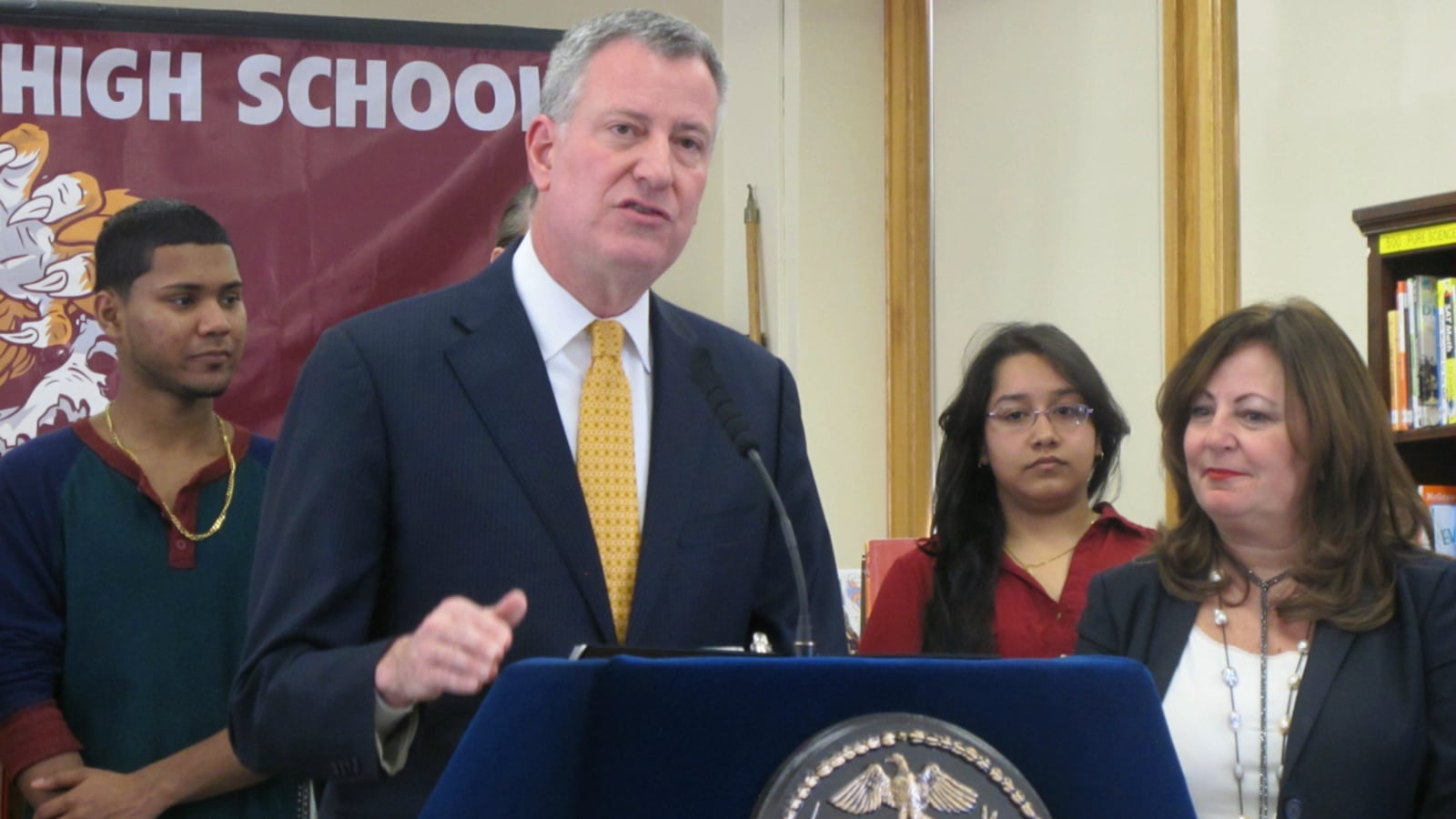The city is engaged in an all-out war against the problem of low-performing schools, Mayor Bill de Blasio said Thursday, as he joined state and city lawmakers in rejecting the governor’s plan to let outside groups take over struggling schools.
The city’s $150 million turnaround program is equivalent to “house-to-house combat,” with education department officials strategizing about how to attack problems at individual troubled schools during “war room” sessions, de Blasio said Thursday, part of an aggressive push in recent weeks to tout his program as a superior alternative to the governor’s plan. In addition, “SWAT teams” of skilled educators will be sent to some schools, even as education officials study the police department’s data-driven approach to crime fighting, de Blasio said.
The mayor had backup: While he was making the case for his turnaround program at a high school in Queens, the City Council held a hearing to praise his plan and attack Gov. Andrew Cuomo’s, and the city teachers union sent members to Albany to defend de Blasio’s approach. The mayor summarized their argument, saying that Cuomo’s takeover plan would derail the progress some struggling schools have already made under the city’s new turnaround program.
“I think the notion of a group of bureaucrats 150 miles away trying to determine the fate of our children sounds like a formula for disaster,” de Blasio said at Richmond Hill High School, one of 94 schools in the Renewal program. “We are illustrating to you today just how urgently we are applying that plan.”
Cuomo has tried to tie his “receivership” plan for struggling schools, along with other aggressive education policies, to the state budget that is due April 1. That gives de Blasio and his allies a reason to promote his Renewal program this month as state lawmakers try to forge a deal with the governor over the budget and those policies.

City Hall highlighted early signs of progress at Brooklyn’s long-struggling Boys and Girls High School last week and Richmond Hill on Thursday, which officials said has recently seen improved attendance and student credit-earning and fewer suspensions.
But both of those schools are part of a high-priority group of struggling schools that have been receiving extra attention and resources even before the Renewal program launched in November. Meanwhile, even as de Blasio promises rapid improvements at all the Renewal schools, some say they have seen little come of the program so far.
“Nothing’s actually happened in terms of helping the school,” an administrator at a Brooklyn Renewal school said Thursday. “There’ve been evaluations, but no support yet.”
Cuomo’s takeover plan would let nonprofit groups, school-turnaround experts, or other school districts seize control of bottom-ranked schools and make drastic changes, even overriding labor agreements in order to fire ineffective teachers. Those “receivers” would also have to add extra support services to the schools — a plan to turn them into “community schools” that mirrors de Blasio’s program.
Democrats who control the state Assembly oppose Cuomo’s plan, as do the city and state teachers unions, which see it as an effort to sidestep educators’ job protections. They also see it as a way to privatize the public school system and to potentially let charter school operators take control of low-performing district schools — a concern raised at Thursday’s City Council hearing.
“The governor is trying to privatize public schools in a roundabout way, through both the receivership and, ultimately, by turning some of the schools over to charter schools,” said education committee chair Daniel Dromm, a close de Blasio administration ally and frequent charter-school critic.
The debate over Cuomo’s takeover plan has overlapped with another debate taking place during state budget talks: whether to extend the mayor’s control over the city school system, which is set to expire this year.
State Sen. John Flanagan, who chairs the senate’s education committee, has said that he is studying de Blasio’s turnaround program as he considers extending mayoral control. (De Blasio has asked lawmakers to make that authority permanent, while Cuomo has proposed renewing it for three years, the assembly called for seven, and the senate did not offer a proposal.) Flanagan was one of several lawmakers visited Thursday by members of the city’s United Federation of Teachers, who argued that de Blasio’s plan will work if given enough time, according to union officials.
For his part, de Blasio said Cuomo’s plan would undermine mayoral control and the steps the city has already taken to improve its troubled schools.
“The state should simply let us get our job done,” he said.
As de Blasio made the case for his turnaround program, he said that the executive superintendent overseeing it visited police headquarters Thursday to observe that department’s famed CompStat system, where officials pore over crime data as they come up with targeted responses. The executive superintendent, Aimee Horowitz, also convened her first “war room” meeting of top department officials and superintendents this week to discuss five individual Renewal schools.
“We’re asking the hard questions,” she said, adding that the meetings will take place biweekly and focus on two or three schools per session. “And talking about next steps.”

